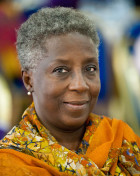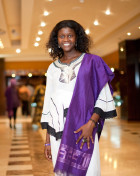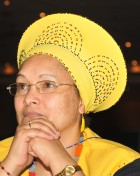I live in Dakar, Senegal where I have been working as a consultant to GREFELS (A research on Women and Law group based in Senegal) since the year 2009. My work as an independent consultant has included being election monitoring, capacity building workshops, networking, drafting of fundraising proposals, implementation of research projects and report-writing.
I am a feminist because in my opinion; women are not occupying their deserved positions in our societies. I believe that as women, we all need to play a role in unearthing the discriminations that women are subjected to under the guise of religion, customs and traditions, and the disparities of social classes. There is a political attempt to stifle the statements of women and that is the reason why it is necessary to revisit history, reinterpret religious verses taking into account trends of our society. Women and girls possess an enormous potential that is still under exploited or whose real value is often not known.
As feminists in Africa, we have a lot to do to in some countries to encourage the education of the girl child, to fight illiteracy and to prevent them from being ignorant of their rights. The inadequate education accounts for most women being victims of injustices and discrimination, something they have taken into their strides simply because society has made them to. The high levels of violence against women in all our countries is another key issues; these include mercy killings, homophobia, death penalty, stoning, repudiation, underage/forced marriages are committed with impunity, indeed where some forms of violence seem enshrined in rules due to the rise in religious fundamentalism or the existence of discriminatory laws against women. In addition, we need to find ways to address the needs of people considered as vulnerable (people living with disabilities, elderly, abused women, etc).
Some of our strategies can include rethinking academic programmes by highlighting in history and science textbooks for example women who played leading roles and to introduce gender equality concepts, human rights, democracy, as early as the primary school stage. It is important that we popularize what feminism really means.
Personally, I try to draw people’s attention to societal prejudices, discrimination and gender-based abuses that are a result of societal construct. In my professional life, I strive to work in a true spirit of respect and solidarity. Although we are often faced with resources and support problems, we are able to overcome them thanks to our relationships with civil society and institutional players.
I feel inspired by my mother, my aunts and my sisters from whom I always learn lessons of generosity and courage. I feel inspired by the generation of men and women who fought valiantly for us to have access to education, the right to vote, and other social advantages





